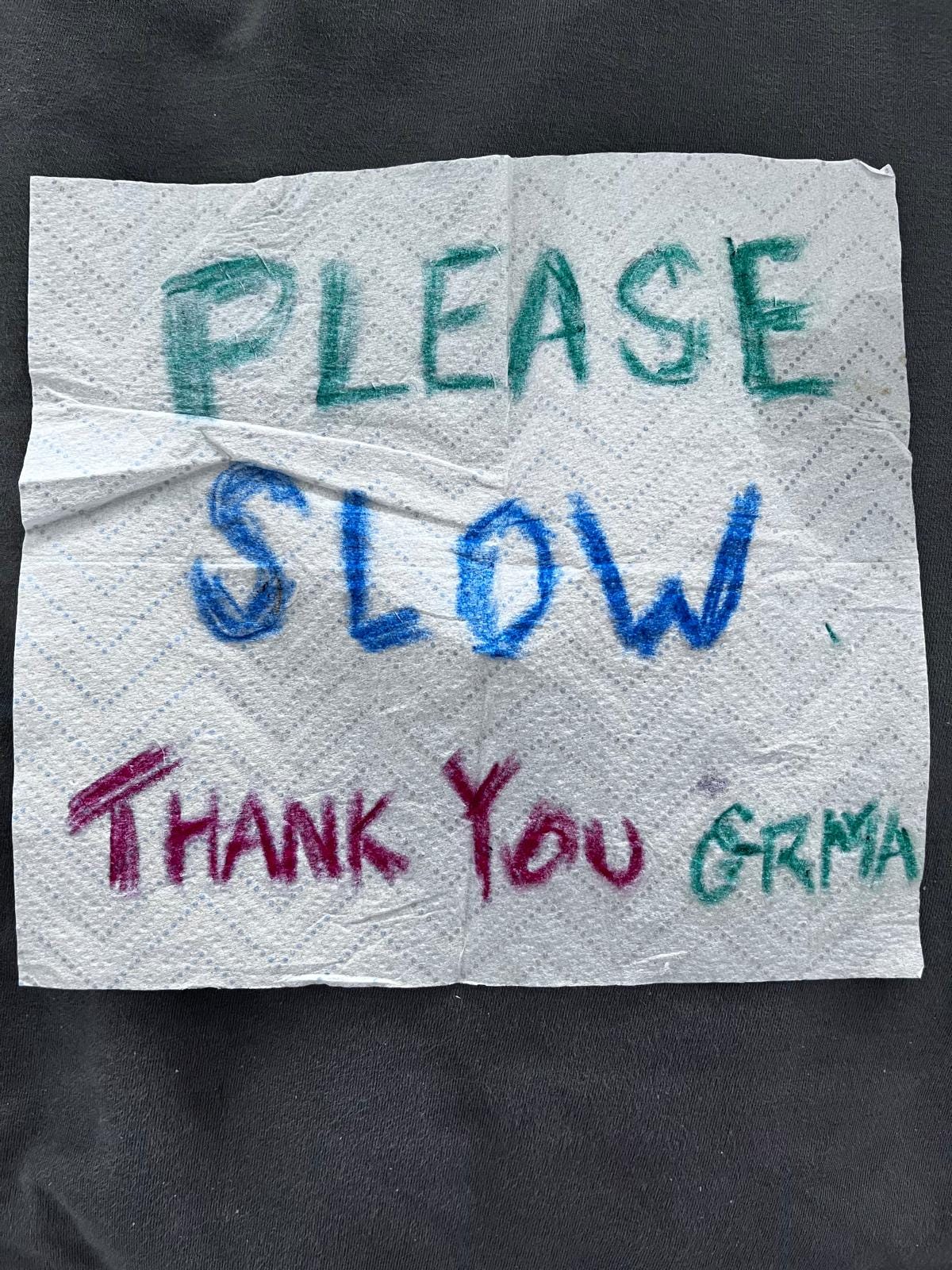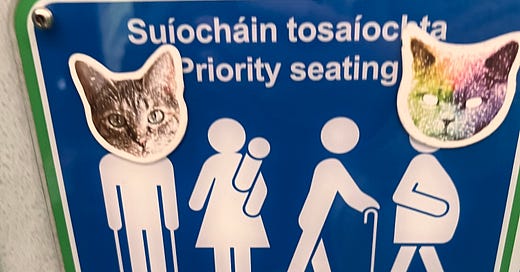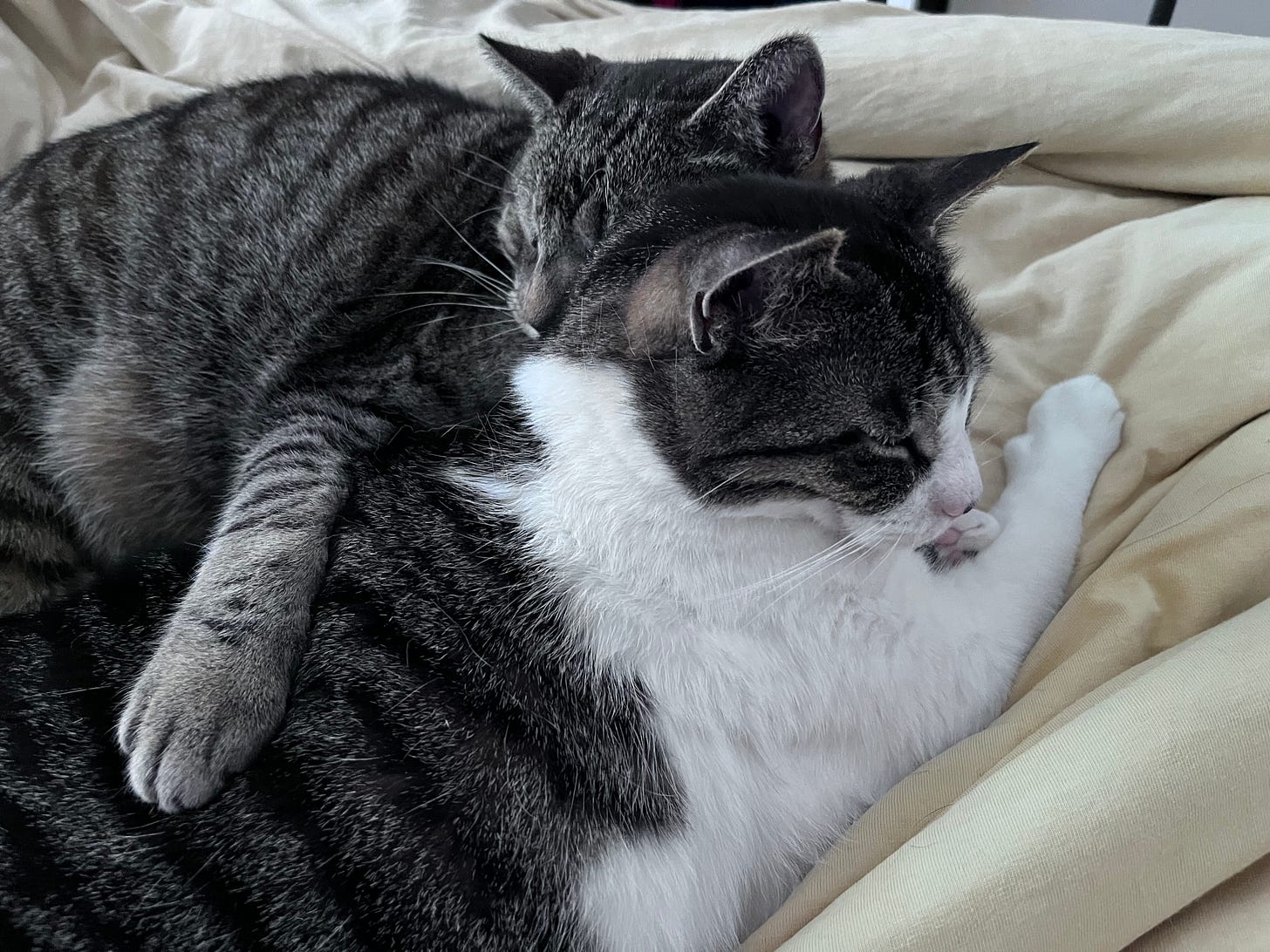Before I dive into this week’s post, I want to thank those who became paid subscribers in the last few weeks. Each new subscription, comment, re-stack and share puts wind in my sails. “Go raibh míle maith agat.” Thank you so much for your interest and support—and for being part of this community of readers.
Also, I’m a baby “Gaeilgeoir,” a beginner in Irish. I share my impressions. When available, I link to Teanglann for reference.
This past week, my partner, mo stóirín (my sweetie), was stressed. This was understandable. For several weeks she’d been taking care of someone (i.e., me and my new hip) who was unable to walk, use the loo, or get in/out of bed on her own. Hobbling on two canes, I couldn’t bend to pick things up, put on my own socks, or carry anything (tea please!). Being present to all this while working full time (mo stór works from home), could try the patience of a saint. (The word “patient” comes from Latin, meaning to suffer or bear; it’s interesting this is what we call the person receiving care.)
When stressed, mo stór’s tone can sharpen. This does not help me hear her. This is perhaps the greatest irony of conflict: as each person increases their volume—wanting to be heard—the less able the other person is to listen. Goodwill flies out the window. This is especially true for me, given my family history. When I hear intensity, I can easily shut down. (In my family of origin, intensity was usually followed by physical punishment.)
In this instance, I was able to respond with tenderness. I hobbled towards her and gently rubbed her solar plexus—the closest I could get to physically touching her heart. “How can you be so sweet with me when I am shouting at you!?” she wanted to know. In that moment, it didn’t take much: I had been thinking about one of my favorite quotes, “Let us then see what love can do.” William Penn, founder of the city of brotherly love (love, phileo + brother, adelphos) asked this question in 1693. Three hundred years later, I am still thinking about it. In that moment, it reminded me, in a Cliff Notes way, to seek the bigger picture: hence the heart rub in response to harshness.

"All we need to bring to the task is love, and the will to bestow it more generously than we have in the past. Poets and philosophers have constructed an elaborate calculus of love. Quakers ask that we only do simple addition. The more love we add to the world, the more loving and humane place it will become." Robert Lawrence Smith, A Quaker Book of Wisdom, p. 98.
For the record, I am not always able to do this. There are plenty of times when I am reactive. Yet this is how I become a better version of myself (or try to): by doing the practices in Be Here Meow and holding on—as if to an amulet—to concepts such as Penn’s.
Amulet
In the Depths
Find
the Strength; The Darkness
wells
Tumultuous
Darkness into
Itself:
the Holy
rain
by Dian Killian © 1990
This is why I moved back to Ireland.
As I wrote about in my first essay, The Liminal, I felt life crushing in around me. I wanted more life-work balance, connection, joy and community. Of course I could find these qualities anywhere. Yet I have spent a good deal of my life relying on self-sufficiency and agency. I see now more than ever how I am influenced (and lifted up) by my environment. It’s like putting a plant in direct sunlight. It’s like keeping a kid out of traffic. It’s like having those words by Penn to rely on. I am shameless at this point. I have a tattoo on my arm that says, “Love harder.” I need to keep reminding myself.
I have also found support in the Irish language. So much is being written about de-colonizing (there are even those de-colonizing Nonviolent Communication—which I already considered a form of decolonization). Yet Irish (estimated to be 2000-3000 years old) developed before colonialism, before Christianity. We don’t have to de-colonize it. The Irish language offers a unique key-hole into what precolonial, pre-industrial, pre-imperial culture looked like.
“Irish is a Celtic language that, via Proto-Celtic (c. 1.000 B.C.), can be derived from the reconstructed Proto-Indo-European language that was spoken in the Neolithic c. 6.000 years ago. […] This relationship not only means that linguistic features and many lexical items of Irish were inherited from the ancestral speech group, but it also entails the possibility that items of cultural and spiritual significance go back to this origin.” Irish Language, David Stifter
Some of these key-holes are simple yet profound.
In English, for example, the word “wife” derives from the Proto-Germanic word for “woman.” From this world view, an adult female is a married woman; in effect, it’s all that an adult female can be. As Jose Pineada puts it:
“‘Wife’ was a specifically female human being. It also doubled .. to mean both ‘adult woman’ as well as ‘the wife of someone.’ Old Indo-Europeans apparently couldn’t conceive [of] an adult woman that wasn’t married to someone, and this usage still persists … For instance in Spanish you can say la mujer de X instead of the regular la esposa de X to refer to the wife of somebody…”
That “wife” originally simply meant “woman” can be seen in other English words such as “midwife” and “housewife.” In Middle-English, “housewife” meant the “mistress of the household.” (See here for more.) Again, there is an uncomfortable and persistent theme: women exist (or only have value) in relation to men; historically, a form of property themselves, women are intimately linked to the property/progeny they are expected to maintain.
Similarly, “husband” comes from the Old English word, husbonda, meaning ‘male head of a household’ and ‘manager, steward.’ This came from Old Norse húsbóndi, ‘master of the house’, from hús ‘house’ + bóndi, ‘occupier and tiller of the soil’. Ultimately, “husband” is someone who holds land and stock. (See here.) As a verb, “to husband” means to use resources economically. “Husbandry” is the care, cultivation and breeding of crops and animals. Again, rather than about care and connection between two human beings, “husband” reveals the highly transactional and property-laden (and fixed gender role) history of marriage.
It’s for this reason that some queer folk didn’t like the idea of gay marriage; they didn’t want to participate in this patriarchal drama. Two straight friends, for these historical reasons, made a conscious choice not to get married, even though raising a family together. Personally, I prefer “partner” to “wife” (though when I say “partner,” people sometimes think I mean business partner). Whatever terms you use in English, it is hard to avoid the highly patriarchal and property-laden history of “husband” and “wife.”
Are you ready for a breath of fresh air?
In Irish, first of all, the words for “husband” and “wife” have beautiful symmetry: like bookends, fear céile is “husband” and bean chéile is wife. Even without knowing what these words mean, they already offer equality. (These are the same words; “bean” is feminine so “h” added to céile to become chéile.)
Fear is man and bean is woman. Céile is short for “together.” So in Irish, “husband” means in effect “the man I’m together with” or “man together” and “wife” means “the woman I’m together with” or “woman together.” This is the person I am with. This is the person I choose to be with. Nothing about household roles, tilling the land, mistress of the house or property or ownership. This is my “together person.” How elegant and true and simple—and sweet—is that?
You can also refer to the person you are “together-with” as just your céile. In Irish, this is how you say “spouse/companion.” In effect, this is shorthand for “my together-person.” Literally, most simply, it’s short for “together.”
OK, I know I am a language nerd. This might seem linguistic minutiae. But just like that quote from Penn, that, because I remembered it, led me to have a moment of tenderness rather than hurt and pain, I am holding dear to my heart this céile thinking.
What does it mean to be “together” with someone? How do I relate to my “together person”? What does it mean and what does it look like to act in a way that’s in the spirit of céile? For me, this is not about loss of individuality. It’s about a focus on connection and relationship. It reminds me of why I am in a relationship at all. Again, I chose to be with this person in a significant way. How are we “together-ing” in how we relate—connecting, understanding, caring and navigating?
What’s even more compelling is that céile is short for le chéile. Literally, a chéile means “each other” and le means with. So the Irish language tells us exactly what it means to be “together:” to be with each other.
I consider it significant how often the word céile turns up in Irish, in different forms. For example, one way you say “my people” is dhaoine céile (“people together” or my “together people”). These are the people who are part of my family, my clan. As I’ll explore in future posts, there is a high level of interdependence and community in indigenous Irish culture. This is seen in how the Irish lived and farmed le chéile. It’s also in the very fiber of the Irish language, including in words that simply don’t exist in English.
For now, I invite you to sit with le chéile-ness.
How do you relate to others in a spirit of togetherness? How do we bring this together-thinking out into the larger world, and into all our relationships? (To discover as Penn would say, “What can love do?”). As we face overwhelming challenges (authoritarianism, war, environmental collapse) what does it mean to think and act truly le chéile, “together,” with each other?
I hope we can find out.
Slán for now, from these liminal times,
Dian, i mBaile Atha Cliath (in Dublin)
Last thoughts…










Love this so much! Learning Irish over the last four years has changed my life in every possible way and the ways in which Irish encodes relational ways of being is one of the things I love about an Ghaeilge. I love that phrase le chéile and also meitheal because I feel like both really capture that sense of togetherness of life live in relation.
Loved reading this Dian thankyou! Very interesting to learn about the underlying cultural significance of language. I agree- love is all important- for those we don’t know or are yet to meet as well as those we know. We are all in this together XX